Hypoinflation - Study guides, Class notes & Summaries
Looking for the best study guides, study notes and summaries about Hypoinflation? On this page you'll find 25 study documents about Hypoinflation.
Page 2 out of 25 results
Sort by
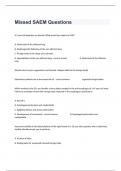
-
Missed SAEM Questions With Complete And Verified Answers.
- Exam (elaborations) • 4 pages • 2024
-
Available in package deal
-
- $12.99
- + learn more
A 5 year old aspirates an almond. What would you expect on CXR? A. Atelectasis of the affected lung B. Diaphragmatic flattening of the non-affected lung C. Foreign body in the shape of an almond D. Hypoinflation of the non-affected lung - correct answer A. Atelectasis of the affected lung (Results due to poor oxygenation and alveolar collapse distal to the foreign body) Edentulous patients are at increased risk of: - correct answer Inge...
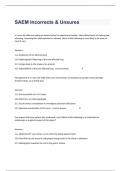
-
SAEM Incorrects & Unsures Research Study Written Exam.
- Exam (elaborations) • 11 pages • 2024
-
Available in package deal
-
- $12.99
- + learn more
A 5 year old child was eating an almond when he experienced sudden, intermittent bouts of choking and wheezing. Assuming this child aspirated an almond, which of the following is most likely to be seen on chest X-ray? Answers: 1.A. Atelectasis of the affected lung 2.B. Diaphragmatic flattening of the non-affected lung 3.C. Foreign body in the shape of an almond 4.D. Hypoinflation of the non-affected lung - correct answer A Management of a 4 year old child with ...
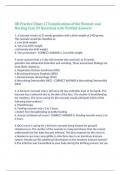
-
OB Practice Chapt 17 Complications of the Neonate and Nursing Care 33 Questions with Verified Answers,100% CORRECT
- Exam (elaborations) • 8 pages • 2024
-
- $10.99
- + learn more
OB Practice Chapt 17 Complications of the Neonate and Nursing Care 33 Questions with Verified Answers 1. A neonate is born at 33 weeks gestation with a birth weight of 2400 grams. This neonate would be classified as: a. Low birth weight b. Very low birth weight c.Extremely low birth weight d. Very premature - CORRECT ANSWER a. Low birth weight A nurse assesses that a 3-day-old neonate who was born at 34 weeks gestation has abdominal distention and vomiting. These assessment findings...
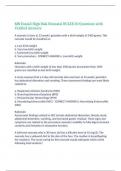
-
MN Exam3 High Risk Neonatal NCLEX 30 Questions with Verified Answers,100% CORRECT
- Exam (elaborations) • 13 pages • 2024
-
- $10.49
- + learn more
MN Exam3 High Risk Neonatal NCLEX 30 Questions with Verified Answers A neonate is born at 33 weeks' gestation with a birth weight of 2400 grams. This neonate would be classified as: a. Low birth weight b. Very low birth weight c. Extremely low birth weight d. Very premature - CORRECT ANSWER a. Low birth weight Rationale: Neonates with a birth weight of less than 2500 grams but greater than 1500 grams are classified as low birth weight. A nurse assesses that a 3-day-old neonate ...
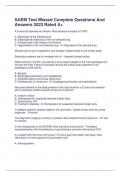
-
SAEM Test Missed Complete Questions and Answers 2023 Rated A+
- Exam (elaborations) • 3 pages • 2024
-
- $21.49
- + learn more
SAEM Test Missed Complete Questions and Answers 2023 Rated A+ A 5-year-old aspirates an almond. What would you expect on CXR? A. Atelectasis of the affected lung B. Diaphragmatic flattening of the non-affected lung C. Foreign body in the shape of an almond D. Hypoinflation of the non-affected lung - A. Atelectasis of the affected lung (Results due to poor oxygenation and alveolar collapse distal to the foreign body) Edentulous patients are at increased risk of: - Ingested foreign ...
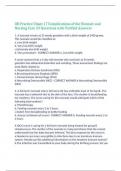
-
OB Practice Chapt 17 Complications of the Neonate and Nursing Care 33 Questions with Verified Answers,100% CORRECT
- Exam (elaborations) • 8 pages • 2024
-
- $10.99
- + learn more
OB Practice Chapt 17 Complications of the Neonate and Nursing Care 33 Questions with Verified Answers 1. A neonate is born at 33 weeks gestation with a birth weight of 2400 grams. This neonate would be classified as: a. Low birth weight b. Very low birth weight c.Extremely low birth weight d. Very premature - CORRECT ANSWER a. Low birth weight A nurse assesses that a 3-day-old neonate who was born at 34 weeks gestation has abdominal distention and vomiting. These assessment findings...
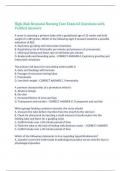
-
High-Risk Neonatal Nursing Care Exam 63 Questions with Verified Answers,100% CORRECT
- Exam (elaborations) • 28 pages • 2024
-
- $11.39
- + learn more
High-Risk Neonatal Nursing Care Exam 63 Questions with Verified Answers A nurse is assessing a preterm baby with a gestational age of 32 weeks and birth weight of 1,389 grams. Which of the following signs if present would be a possible indication of RDS. A. Expiratory grunting and intercostal retractions. B. Respiratory rate of 46 breaths per minute and presence of acrocyanosis. C. Mild nasal flaring and heart rate of 140 beats per minute. D. Bradycardia and bounding pulse - CORRECT A...
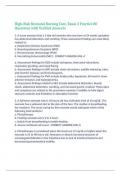
-
High-Risk Neonatal Nursing Care, Exam 3 Practice 80 Questions with Verified Answers,100% CORRECT
- Exam (elaborations) • 39 pages • 2024
-
- $11.39
- + learn more
High-Risk Neonatal Nursing Care, Exam 3 Practice 80 Questions with Verified Answers 2. A nurse assesses that a 3-day-old neonate who was born at 34 weeks' gestation has abdominal distention and vomiting. These assessment findings are most likely related to: a. Respiratory Distress Syndrome (RDS) b. Bronchopulmonary Dysplasia (BPD) c. Periventricular Hemorrhage (PVH) d. Necrotizing Enterocolitis (NEC) - CORRECT ANSWER ANS: d a. Assessment findings for RDS include tachypnea, intercosta...
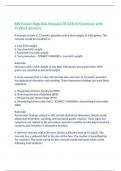
-
MN Exam3 High Risk Neonatal NCLEX 30 Questions with Verified Answers,100% CORRECT
- Exam (elaborations) • 13 pages • 2024
-
- $10.49
- + learn more
MN Exam3 High Risk Neonatal NCLEX 30 Questions with Verified Answers A neonate is born at 33 weeks' gestation with a birth weight of 2400 grams. This neonate would be classified as: a. Low birth weight b. Very low birth weight c. Extremely low birth weight d. Very premature - CORRECT ANSWER a. Low birth weight Rationale: Neonates with a birth weight of less than 2500 grams but greater than 1500 grams are classified as low birth weight. A nurse assesses that a 3-day-old neonate ...
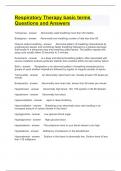
-
Respiratory Therapy basic terms Questions and Answers
- Exam (elaborations) • 8 pages • 2024
-
Available in package deal
-
- $12.99
- + learn more
Respiratory Therapy basic terms Questions and Answers Tachypnea Abnormally rapid breathing more than 20 breaths Bradypnea Abnormally low breathing number of rate less than 60 Cheyne stokes breathing Abnormal pattern of breathing characterized by progressively deeper and sometimes faster breathing followed by a gradual decrease that results in a temporary stop and breathing called apnea. The pattern repeats with eacg cycle usually taken 30 seconds to 2 minutes. Kussmaul'...

Study stress? For sellers on Stuvia, these are actually golden times. KA-CHING! Earn from your study resources too and start uploading now. Discover all about earning on Stuvia


